|
|
|
Sort Order |
|
|
|
Items / Page
|
|
|
|
|
|
|
| Srl | Item |
| 1 |
ID:
083541
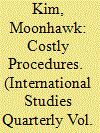

|
|
|
|
|
| Publication |
2008.
|
| Summary/Abstract |
Increasing legalization of international institutions has divergent effects on member countries. Whereas legalization decreases uncertainty and increases convergence of countries' expectations on international outcomes, it imposes costs on countries by increasing the complexity and difficulty of procedures for them to utilize. Countries with the administrative capacity to follow elaborate procedures reap the benefits of increased legalization. For countries without such capacity-primarily developing countries-the potential benefits are offset by their difficulty in following the procedures. I examine this argument against the institutional changes in dispute settlement procedures that occurred in the transition from the General Agreement on Tariffs and Trade (GATT) to the World Trade Organization (WTO). Compared to the GATT era, developed countries-ones with greater capacity-are much more likely to utilize dispute settlement in the WTO than developing countries. Gains from the institutional changes in dispute settlement procedures have accrued to benefit mostly developed member countries in the WTO.
|
|
|
|
|
|
|
|
|
|
|
|
|
|
|
|
| 2 |
ID:
083537
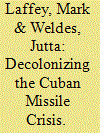

|
|
|
|
|
| Publication |
2008.
|
| Summary/Abstract |
Postcolonial scholars show how knowledge practices participate in the production and reproduction of international hierarchy. A common effect of such practices is to marginalize Third World and other subaltern points of view. For three decades, analysis of the Cuban missile crisis was dominated by a discursive framing produced in the ExComm, one in which Cuba was invisible. The effort to produce a critical oral history enabled Cuban voices-long excluded from interpretive debates about the events of October 1962-to challenge the myth of the crisis as a superpower affair. Despite the oral history project's postcolonial intervention, however, and greater attention to Cuba's role in the crisis, this framing persists and is reproduced in the micro-practices of scholarship. Decolonizing the crisis, and by extension the discipline itself, is not easy to do.
|
|
|
|
|
|
|
|
|
|
|
|
|
|
|
|
| 3 |
ID:
083536
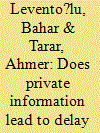

|
|
|
|
|
| Publication |
2008.
|
| Summary/Abstract |
Many game-theoretic models of crisis bargaining find that under incomplete information, an initial offer is either accepted, or war occurs. However, this finding is odd in two ways: (a) empirically, there are many cases of an agreement being peacefully reached after a number of offers and counteroffers and (b) theoretically, it is not clear why a state would ever leave the bargaining table and opt for inefficient war. We analyze a model in which, as long as the dissatisfied state is not too impatient, equilibria exist in which an agreement is peacefully reached through the offer-counteroffer process. Our results suggest that private information only leads to war in conjunction with other factors that are correlated with impatience, such as domestic political vulnerability, exogenous obstacles to the ability to make counteroffers rapidly, and bargaining tactics that create incentives to strike quickly or that lock the actors into war.
|
|
|
|
|
|
|
|
|
|
|
|
|
|
|
|
| 4 |
ID:
083534
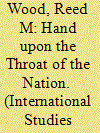

|
|
|
|
|
| Publication |
2008.
|
| Summary/Abstract |
While intended as a nonviolent foreign policy alternative to military intervention, sanctions have often worsened humanitarian and human rights conditions in the target country. This article examines the relationship between economic sanctions and state-sponsored repression of human rights. Drawing on both the public choice and institutional constraints literature, I argue that the imposition of economic sanctions negatively impacts human rights conditions in the target state by encouraging incumbents to increase repression. Specifically, sanctions threaten the stability of target incumbents, leading them to augment their level of repression in an effort to stabilize the regime, protect core supporters, minimize the threat posed by potential challengers, and suppress popular dissent. The empirical results support this theory. These findings provide further evidence that sanctions impose political, social, and physical hardship on civilian populations. They also underscore a need for improvements in current strategies and mechanisms by which states pursue foreign-policy goals and the international community enforces international law and stability.
|
|
|
|
|
|
|
|
|
|
|
|
|
|
|
|
| 5 |
ID:
083533
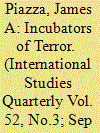

|
|
|
|
|
| Publication |
2008.
|
| Summary/Abstract |
A growing body of scholars and policymakers have raised concerns that failed and failing states pose a danger to international security because they produce conditions under which transnational terrorist groups can thrive. This study devises an empirical test of this proposition, along with counter-theories, using simple descriptive statistics and a time-series, cross-national negative binomial analysis of 197 countries from 1973 to 2003. It finds that states plagued by chronic state failures are statistically more likely to host terrorist groups that commit transnational attacks, have their nationals commit transnational attacks, and are more likely to be targeted by transnational terrorists themselves
|
|
|
|
|
|
|
|
|
|
|
|
|
|
|
|
| 6 |
ID:
083540
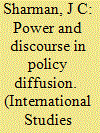

|
|
|
|
|
| Publication |
2008.
|
| Summary/Abstract |
Twenty years ago not a single country had a policy against money laundering; currently, over 170 have very similar anti-money laundering (AML) policies in place. Why have so many countries with so little in common adopted the same policy so rapidly? This extensive diffusion is particularly puzzling given the lack of evidence that AML policies actually work. In explaining the international spread of AML policies, this article draws on recent literature from International Relations, sociology, comparative politics, and public policy dealing with policy diffusion and policy transfer, but also differs from most of this work in two key aspects: First, it is argued that the process of diffusion in the developing world has been much more power-based than voluntary. Second, the mechanisms driving policy diffusion (direct coercion, mimicry, and competition) are all shown to be discursively mediated exercises of power, rather than reflecting rational learning or brute material forces. Evidence is drawn from surveys, interviews, and participant-observation in developing countries from three regions.
|
|
|
|
|
|
|
|
|
|
|
|
|
|
|
|
| 7 |
ID:
083539


|
|
|
|
|
| Publication |
2008.
|
| Summary/Abstract |
While private authority beyond the state has become a popular theme of academic writing, the role of stakeholders in the Southern hemisphere as objects and subjects of private transnational governance has rarely been addressed in the literature. To fill this gap, this article examines three private transnational governance (PTG) schemes in the field of global sustainability politics and their relation to the South. The analysis shows that, contrary to common assumptions, PTG schemes exert a significant influence on Southern stakeholders. They shape the meaning of key normative concepts, induce discursive shifts that constrain the ways in which sustainability politics may or may not be framed, and establish new regulatory frameworks to which Southern actors need to respond. Yet, while Northern interests are well represented, the representation of Southern stakeholders remains low. It is particularly low in knowledge-centered elements of the governance schemes. In contrast, where issues are explicitly framed in political terms and where decision-making processes extend across multiple levels, the quality of Southern representation increases.
|
|
|
|
|
|
|
|
|
|
|
|
|
|
|
|
| 8 |
ID:
083532


|
|
|
|
|
| Publication |
2008.
|
| Summary/Abstract |
Compared with the realist tradition, relatively few students of international relations explore variations within liberalism. This paper introduces a particular interpretation of Immanuel Kant's evolutionary liberalism and then compares it with Thomas Paine's revolutionary liberalism. Paine was an ebullient optimist while Kant was more guarded and cautious. These different assumptions lead to distinct liberal views on voting rights, how trade fosters peace, and defense policies. The most striking disagreement, and one that endures in contemporary liberal circles, revolves around the question of military interventions to spread democratic rule. Kant advocated nonintervention while Paine actively pursued military intervention to spread democratic rule. Differences between Kant and Paine represent some enduring tensions still residing within the liberal tradition in international relations
|
|
|
|
|
|
|
|
|
|
|
|
|
|
|
|
| 9 |
ID:
083538


|
|
|
|
|
| Publication |
2008.
|
| Summary/Abstract |
The liberal formula for peace and prosperity in the 21st century involves substantial convergence in economic growth rates between the affluent North and the poor South, facilitating a decrease in the global North-South gap. This diminished developmental gap should lead to reduced conflict within the South and between the North and South. The problem is that long-term world economic growth is stimulated in part by intermittent upsurges in radical technology generated principally in the system's lead economy. These growth impulses diffuse outwards from the center of the North unevenly. We hypothesize that Northern economies are the primary beneficiaries of these periodic extensions of the technological frontier and that much less trickles down to the South. We test this question of uneven diffusion with time series data dating back to 1870 on systemic leadership growth, Northern economic growth, and Southern economic growth. We find that technological gains in the North have been more likely to expand the North-South gap than to close it. To the extent that the South and Southern turmoil are a function of uneven growth and stratification, neither is apt to disappear anytime soon.
|
|
|
|
|
|
|
|
|
|
|
|
|
|
|
|
| 10 |
ID:
083535


|
|
|
|
|
| Publication |
2008.
|
| Summary/Abstract |
Does a vibrant civil society lead to a more peaceful society? The notion that inclusive civic institutions can facilitate peaceful conflict resolution has become a cornerstone of economic development efforts, but little rigorous work tests this proposition. One obstacle to confirming this popular notion is the endogeneity of these institutions. It is difficult to tell whether civic institutions influence behavior or whether individuals who join civic institutions are a priori less likely to believe in using violence to achieve political goals. Cross-national quantitative analysis systematically examines this relationship, finding that many common demographic factors affect individuals' participation in civic associations, but that membership in such associations plays little or no role in determining individual attitudes toward political violence. These results bear directly on debates in the scholarly and policy world about how best to create the conditions for a peaceful democratic society
|
|
|
|
|
|
|
|
|
|
|
|
|
|
|
|
|
|
|
|
|